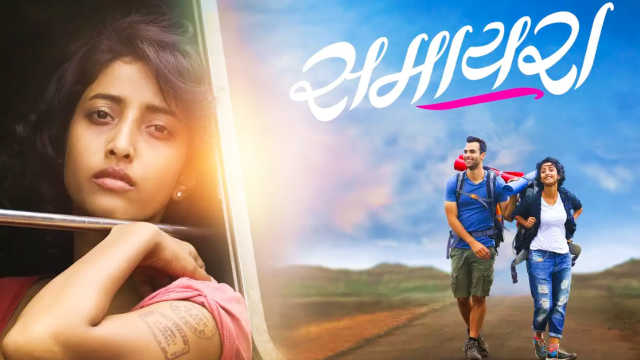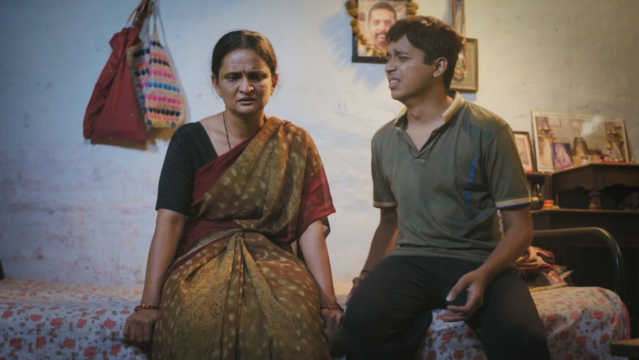
Keyur Seta
Mumbai, 23 Feb 2018 4:00 IST
The mature handling of a film about emotions and relations makes it hard to believe this is Pratima Joshi's directorial debut.

While watching Pratima Joshi's directorial debut Aamhi Doghi, you realize pretty soon that contrary to the expectation raised by the title and the trailer, this isn't a film about two women.
But once you get over that shock, perhaps even disappointment, you will notice that Aamhi Doghi is a rewarding film about emotions and relationships.
Currently living in Mumbai, Savitri aka Savi (Priya Bapat) recalls her life starting from childhood. She was born and brought up in Kolhapur where her father (Kiran Karmarkar) is a successful lawyer. Her mother passed away when Savi was still a child. Her father has brought her up to be a practical person. She is now a confident young woman who knows exactly what she wants.
One day, out of the blue, Amala aka Ammi (Mukta Barve) enters her life and slowly becomes her companion. Meanwhile, Savi’s life training starts backfiring on her own father. The young woman does as she pleases, ignoring the restrictions he tries to impose upon her. As the tension between father and daughter grows, Savi finds solace in Ammi's company.
Aamhi Doghi is more about the treatment than the story, which is not to suggest that the film has no story. The exposition of the plot follows a smooth and natural path and does not deviate ever, which speaks volumes for the writing and the direction. Throughout, it is difficult to believe this is Joshi’s first film as director. She displays remarkable control over and maturity in handling complex characters and diverse emotions ranging from childlike humour to adult frustration.
When a film has more than one female protagonist, the popular tendency is to classify it as a 'woman-orientated' film, even among those who do not answer to the name 'Pahlaj Nihalani'. But to describe Aamhi Doghi as such would be a travesty. The film gives a lot of importance to human emotions, and both sexes will find it easy to connect with it.
The biggest achievement here is the treatment of Savi’s character. Her behaviour and beliefs would have appeared weird if the character's graph had not been handled with precision. The direction also makes the point that circumstances are often to blame for the decisions an individual makes.
An area of concern is the film's runtime. It is indeed quite long at 140 minutes and there are moments in the second half when the narrative starts to drag a bit. The production design also leaves something to be desired. For instance, the BEST buses seen on the streets when Savi arrives in Mumbai are of a design that was only introduced recently.
The technical departments, however, leave a positive mark. Usually Indian films dealing with family dramas are notorious for loud soap operatic sound. But there is hardly any use of a background score in Aamhi Doghi, forget about it being loud. A welcome change indeed!
Mangesh Dhakde's moving composition ‘Konte Naatey', sung by Vaishali Mhade, is perfect as the film's theme song.
Cinematographer Milind Jog, the man behind last year's action drama Faster Fene, delivered excellent indoor camera work in Muramba (2017) and last week’s Gulabjaam (2018), and he continues his good form here.
Aamhi Doghi relies a lot on Priya Bapat and the actress, who, in an unusual move, plays three different ages of her character herself, does not let the audience down. This is easily one of Bapat's finest acts. There are moments when she has to portray emotional detachment while not appearing callous, and she makes it look ridiculously easy.
Mukta Barve correctly underplays Ammi, whose nature is exactly the opposite of Savi's. But the lack of dimensions to her character and the limited screen time she is given do hamper her performance.
Kiran Karmarkar displays the haughtiness and practical nature of a successful lawyer to good effect. Arti Wadagbalkar in the role of Savi’s friend and Prasad Barve as the friend's husband are adequate. Bhushan Pradhan as Savi's love interest isn’t bad either.
You might also like

Review Marathi
Samaira review: This well-intentioned travel drama suffers from a dull script
Actor Rishi Deshpande's directorial debut doesn't rise as much as its performances. ...

Review Marathi
Goshta Arjunchi review: Triggering conversations about mental health
Anupam Barve’s short film urges people to talk to their families about what they are going...

Review Marathi
Ekda Kaay Zala review: Sumeet Raghvan impresses in a film that does not use its full potential
Directed by Dr Saleel Kulkarni, the film has a fine act by child artiste Arjun Purnapatre....

